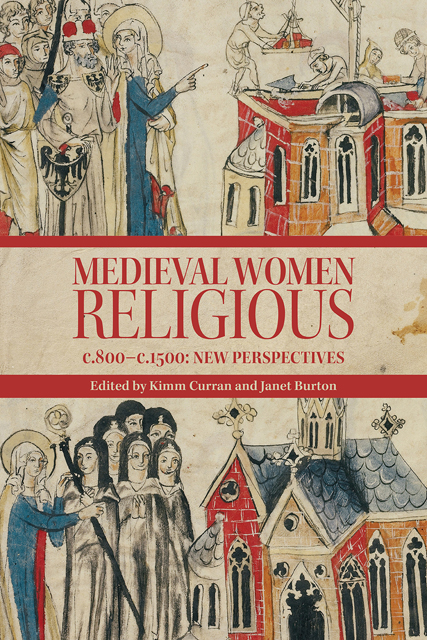Book contents
- Frontmatter
- Contents
- Illustrations
- Contributors
- Preface
- Abbreviations
- Introduction
- 1 Reform, Change, and Renewal: Women Religious in the Central Middle Ages, 800–1050
- 2 New Movements of the Twelfth Century: Diversity, Belonging, and Order(s)
- 3 Change and Renewal: Mendicants and Tertiaries in Later Medieval Europe
- 4 On the Fringes: Anchorites
- 5 ‘Quasi-religious’: Vowesses
- 6 Authority and Agency: Women as Heads of Religious Houses
- 7 Women Religious, Secular Households: The Outside World and Crossing Boundaries in the Later Middle Ages
- 8 Literacies, Learning, and Communal Reform: The Case of Alijt Bake
- 9 Family and Friends: Gift-giving, Books, and Book Inscriptions in Women’s Religious Communities
- 10 Communities of Medieval Religious Women and Their Landscapes
- 11 Materiality and Archaeology of Women Religious
- 12 Between Collective Memory and Individual Remembrance in Women’s Religious Communities
- Select Bibliography
- Index
- Miscellaneous Endmatter
11 - Materiality and Archaeology of Women Religious
Published online by Cambridge University Press: 08 June 2023
- Frontmatter
- Contents
- Illustrations
- Contributors
- Preface
- Abbreviations
- Introduction
- 1 Reform, Change, and Renewal: Women Religious in the Central Middle Ages, 800–1050
- 2 New Movements of the Twelfth Century: Diversity, Belonging, and Order(s)
- 3 Change and Renewal: Mendicants and Tertiaries in Later Medieval Europe
- 4 On the Fringes: Anchorites
- 5 ‘Quasi-religious’: Vowesses
- 6 Authority and Agency: Women as Heads of Religious Houses
- 7 Women Religious, Secular Households: The Outside World and Crossing Boundaries in the Later Middle Ages
- 8 Literacies, Learning, and Communal Reform: The Case of Alijt Bake
- 9 Family and Friends: Gift-giving, Books, and Book Inscriptions in Women’s Religious Communities
- 10 Communities of Medieval Religious Women and Their Landscapes
- 11 Materiality and Archaeology of Women Religious
- 12 Between Collective Memory and Individual Remembrance in Women’s Religious Communities
- Select Bibliography
- Index
- Miscellaneous Endmatter
Summary
The discipline of archaeology is principally concerned with the study of past societies through the physical and material remains and associated environ¬mental material. All remains, objects, and any other traces of humankind from the past are considered elements of archaeological heritage and worthy of study. Frequently, archaeological evidence can contradict written accounts, or bring completely new evidence to bear, and so archaeology has its own unique con¬tribution to make in the study of the past. Medieval archaeology in particular – perhaps because of its relatively later development as a discipline in comparison to history – was once considered history's ‘handmaiden’, where archaeological evidence complemented the supposedly already-known written evidence, and thus merely reproduced ‘another discipline's idea of the past’. However, the use of material culture and archaeology to discover women religious is a relatively new approach in the study of women's monasticism and its importance is steadily increasing as new archaeological discoveries are made.
This chapter focuses on how the use of archaeology can enhance our under¬standing of the variety of women religious and religious practice, as well as the dis¬tinctiveness in sites and standing remains. The first part provides a brief overview of the historiography of archaeological research and women religious, followed by a consideration of the archaeology and wider material culture of communities of women religious: their architecture, and artefactual evidence primarily from communities in England, Ireland, Scotland, and Germany. It continues with a discussion of the evidence derived from current archaeological excavation and investigation of material culture, as well as an archaeological landscape approach, particularly in relation to monastic estates. The chapter concludes with sugges¬tions for future interdisciplinary studies, which are critical to the development of the study of medieval women religious.
A Brief Historiography of Archaeological Research into Women's Religious Communities
It has been suggested that a predominantly male scholarship, in both history and archaeology, downplayed women's monasticism, although whether this was a deliberate act of misogyny or otherwise is perhaps a moot point. Over the last three decades, historiography on women religious, however, has been affected by feminism and feminist approaches. The ‘three waves’ of feminism and other changing philosophical approaches, affected archaeological discourses across Europe and America. Within an English context Roberta Gilchrist was the first archaeologist explicitly to employ a theoretical and gendered archaeological approach to a monument type in England, and indeed Europe, which created a watershed moment in the discipline of archaeology.
- Type
- Chapter
- Information
- Medieval Women Religious, c.800-c.1500New Perspectives, pp. 182 - 201Publisher: Boydell & BrewerPrint publication year: 2023



